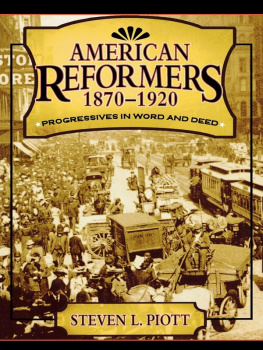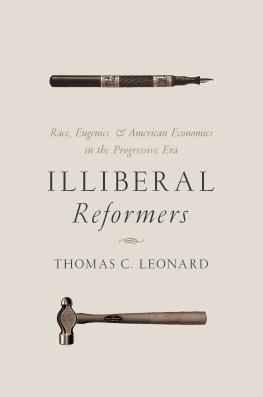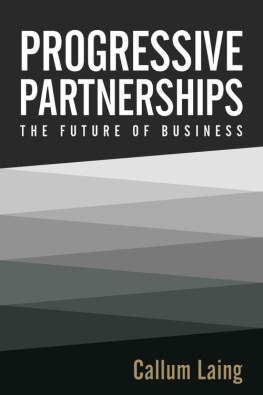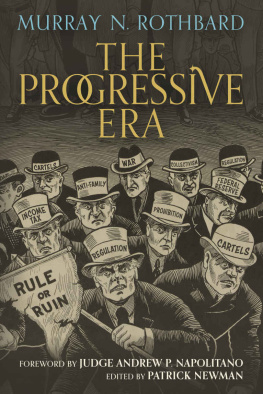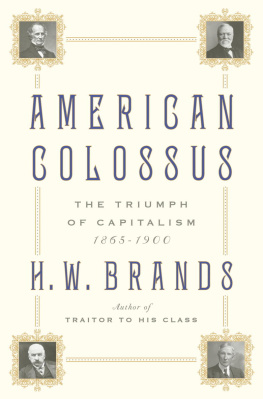Gabriel Kolko - The Triumph of Conservatism: A Reinterpretation of American History, 1900-1916
Here you can read online Gabriel Kolko - The Triumph of Conservatism: A Reinterpretation of American History, 1900-1916 full text of the book (entire story) in english for free. Download pdf and epub, get meaning, cover and reviews about this ebook. year: 1977, publisher: Free Press, genre: Politics. Description of the work, (preface) as well as reviews are available. Best literature library LitArk.com created for fans of good reading and offers a wide selection of genres:
Romance novel
Science fiction
Adventure
Detective
Science
History
Home and family
Prose
Art
Politics
Computer
Non-fiction
Religion
Business
Children
Humor
Choose a favorite category and find really read worthwhile books. Enjoy immersion in the world of imagination, feel the emotions of the characters or learn something new for yourself, make an fascinating discovery.

- Book:The Triumph of Conservatism: A Reinterpretation of American History, 1900-1916
- Author:
- Publisher:Free Press
- Genre:
- Year:1977
- Rating:3 / 5
- Favourites:Add to favourites
- Your mark:
- 60
- 1
- 2
- 3
- 4
- 5
The Triumph of Conservatism: A Reinterpretation of American History, 1900-1916: summary, description and annotation
We offer to read an annotation, description, summary or preface (depends on what the author of the book "The Triumph of Conservatism: A Reinterpretation of American History, 1900-1916" wrote himself). If you haven't found the necessary information about the book — write in the comments, we will try to find it.
A radically new interpretation of the Progressive Era which argues that business leaders, and not the reformers, inspired the eras legislation regarding business.
The Triumph of Conservatism: A Reinterpretation of American History, 1900-1916 — read online for free the complete book (whole text) full work
Below is the text of the book, divided by pages. System saving the place of the last page read, allows you to conveniently read the book "The Triumph of Conservatism: A Reinterpretation of American History, 1900-1916" online for free, without having to search again every time where you left off. Put a bookmark, and you can go to the page where you finished reading at any time.
Font size:
Interval:
Bookmark:
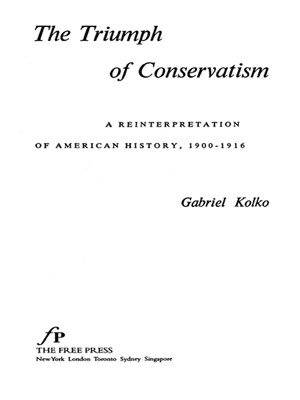
Atheneum Books for Young Readers
An imprint of Simon & Schuster Childrens Publishing Division
1230 Avenue of the Americas, New York, New York 10020
www.SimonandSchuster.com
This book is a work of fiction. Any references to historical events, real people, or real locales are used fictitiously. Other names, characters, places, and incidents are products of the authors imagination, and any resemblance to actual events or locales or persons, living or dead, is entirely coincidental.
Copyright 1963 by The Free Press
All rights reserved, including the right of reproduction in whole or in part in any form.
THE FREE PRESS and colophon are trademarks of Simon & Schuster Inc.
First Free Press Paperback Edition 1977
Manufactured in the United States of America
Library of Congress Catalog Card Number: 63-16588
ISBN 0-02-916650-0
eISBN-13: 978-1-4391-1872-6
ISBN-13: 978-0-0291-6650-5
To my parents
EVERY RESEARCHER owes debts to library workers and archivists that can only be acknowledged but never repaid. This book would be far poorer were it not for the splendid assistance given by the staff of the various sections of the National Archives, and especially the Business Economics Branch. I am also grateful for the cooperation given by the staffs of the Manuscript Division of the Library of Congress, the University of Virginia Library, the Columbia University Library, and the Williams College Library. The various Harvard University Libraries provided not only admirable working facilities but also a congenial climate and stimulating friends.
All references to Federal Trade Commission materials in the National Archives, or manuscripts in the F.T.C. Building, are based on the commissions kind permission to allow me to examine their hitherto closed records. Needless to say, neither the commission nor any other agency is in any way responsible for my use and interpretation of materials under their jurisdiction.
Readers will notice that I do not discuss railroads in my history. Such a consideration will be the topic of a more specialized volume, Railroads and Regulation, to be published in the near future. Suffice it to say, the history of railroads and government regulation in the period 1877-1916 reinforces the more general theme developed in this book.
GABRIEL KOLKO
THIS IS A BOOK that is motivated by a concern with the seemingly nonacademic question of what might have been. All men speculate or dream as they choose, but the value of the speculation depends on the questions asked and on the way they are answered. Speculation of the type prompting this volume has its value only if it leads to the reexamination of what happenedwhat really happenedin the past.
The political or economic history of a single nation, especially during a specific, critical period which has a determining influence on the decades that follow, should be examined with provocative questions in mind. And there is no more provocative question than: Could the American political experience in the twentieth century, and the nature of our economic institutions, have been radically different? Every society has its Pangloss who will reply in the negative. But to suggest that such a reply is mere apologetics would be a fruitless, inaccurate oversimplification. Predominantly, the great political and sociological theorists of this century have pessimistically described and predicted an inexorable trend toward centralization, conformity, bureaucracytoward a variety of totalitarianismand yet they have frequently been personally repelled by such a future.
Unless one believes in an invisible, transcendent destiny in American history, the study of men and institutions becomes the prerequisite for discovering how ones question should be answered. The nature of the questions in this study demands that history be more than a reinterpretation of what is already known, in large part because what is known is insufficient, but also because histories of America from the turn of the century onwards have all too frequently been obsessed by effects rather than causes. Theories and generalizations based on such an approach have ignored concrete actions and intentions, and for this reason the study of consequences and effects has also been deficient.
Assuming that the burden of proof is ultimately on the writer, I contend that the period from approximately 1900 until the United States intervention in the war, labeled the progressive era by virtually all historians, was really an era of conservatism. Moreover, the triumph of conservatism that I will describe in detail throughout this book was the result not of any impersonal, mechanistic necessity but of the conscious needs and decisions of specific men and institutions.
There were any number of options involving government and economics abstractly available to national political leaders during the period 1900-1916, and in virtually every case they chose those solutions to problems advocated by the representatives of concerned business and financial interests. Such proposals were usually motivated by the needs of the interested businesses, and political intervention into the economy was frequently merely a response to the demands of particular businessmen. In brief, conservative solutions to the emerging problems of an industrial society were almost uniformly applied. The result was a conservative triumph in the sense that there was an effort to preserve the basic social and economic relations essential to a capitalist society, an effort that was frequently consciously as well as functionally conservative.
I use the attempt to preserve existing power and social relationships as the criterion for conservatism because none other has any practical meaning. Only if we mechanistically assume that government intervention in the economy, and a departure from orthodox laissez faire, automatically benefits the general welfare can we say that government economic regulation by its very nature is also progressive in the common meaning of that term. Each measure must be investigated for its intentions and consequences in altering the existing power arrangements, a task historians have largely neglected.
I shall state my basic proposition as baldly as possible so that my essential theme can be kept in mind, and reservations and intricacies will be developed in the course of the book. For the sake of communication I will use the term progressive and progressivism, but not, as have most historians, in their commonsense meanings.
Progressivism was initially a movement for the political rationalization of business and industrial conditions, a movement that operated on the assumption that the general welfare of the community could be best served by satisfying the concrete needs of business. But the regulation itself was invariably controlled by leaders of the regulated industry, and directed toward ends they deemed acceptable or desirable. In part this came about because the regulatory movements were usually initiated by the dominant businesses to be regulated, but it also resulted from the nearly universal belief among political leaders in the basic justice of private property relations as they essentially existed, a belief that set the ultimate limits on the leaders possible actions.
It is business control over politics (and by business I mean the major economic interests) rather than political regulation of the economy that is the significant phenomenon of the Progressive Era. Such domination was direct and indirect, but significant only insofar as it provided means for achieving a greater endpolitical capitalism.
Font size:
Interval:
Bookmark:
Similar books «The Triumph of Conservatism: A Reinterpretation of American History, 1900-1916»
Look at similar books to The Triumph of Conservatism: A Reinterpretation of American History, 1900-1916. We have selected literature similar in name and meaning in the hope of providing readers with more options to find new, interesting, not yet read works.
Discussion, reviews of the book The Triumph of Conservatism: A Reinterpretation of American History, 1900-1916 and just readers' own opinions. Leave your comments, write what you think about the work, its meaning or the main characters. Specify what exactly you liked and what you didn't like, and why you think so.

